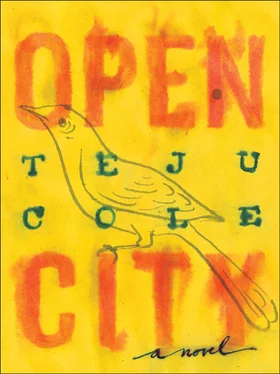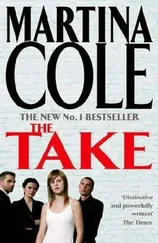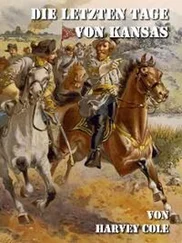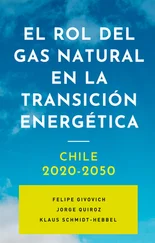I saw someone, at last, at the far end of the street. It wasn’t the far end, just two blocks down. The person was small, slow, like a memory approaching. Picking myself up, brushing my clothes clean, I began to walk, limping a little, gritting my teeth, feeling the ugliness spread across my face. But this person bought my disguise. It was an elderly man in overalls. He walked past, and did not notice, or did not care to notice, that I had just been beaten.
Walking back, I stayed in the shadows for as long as I could. It wasn’t far. The boys had melted away into the park, and were probably far away, somewhere deep in Harlem, by now. The lobby was empty, the elevator free. I entered my apartment and stood before the bathroom mirror for a long time. I touched my jaw, traced a finger gently up onto the cheek. It hurt, swollen to a furious purple. I removed my clothes, first the filthy black coat, then the pristine powder-blue shirt rumpled underneath it. The shirt, which I rarely wore, was a gift from Nadège. Clarity returned: I must clean the wounds (a hospital visit did not seem necessary), and I must make a report. My credit cards, too: that was the first call to make, to limit the financial damage. Then the campus police, who would put up a sign by the elevator announcing (as so often before, in all the previous instances when I wasn’t the victim) that someone had recently been attacked in the neighborhood, and that the suspects were male, black, and young, of average height and weight.
I opened the window and looked out. It was total darkness now, and the sky was a charcoal gray, the darkness interrupted closer to ground level by distant halogen lights. The buildings across the street were apartments, mostly occupied by students and faculty of the various institutions of the neighborhood, Teachers College, Union Theological Seminary, the Jewish Theological Seminary, and Columbia Law School. In one of the apartments, the one almost directly level with mine, a young woman faced a wall. She was wearing a shawl, and bowed her head repeatedly, davening in the yellow light of a standing lamp. A few floors above her, on the flat roof of the building, a large chimney belched out gray smoke in a wide plume. The smoke was like a slowed-down explosion, silent, billowing, being absorbed at its edges into the deeper darkness of the sky. My own apartment was dark. I had made some tea, and I drank it as I watched the woman pray. Others are not like us, I thought to myself, their forms are different from ours. Yet I prayed, too, I would gladly face a wall and daven, if that was what had been given to me. Prayer was, I had long settled in my mind, no kind of promise, no device for getting what one wanted out of life; it was the mere practice of presence, that was all, a therapy of being present, of giving a name to the heart’s desires, the fully formed ones, the as yet formless ones.
It had been only two hours. I trembled from the shock, still gasped inwardly at the suddenness of it; but already, it felt in some way like a school yard scuffle. Had I sailed through a brief moment when, like an old man welcoming death, I had accepted the next blow and the next? No, I hadn’t. I had felt only the fear of pain and the love of being free of pain. But how could I have missed this! I’d thought, lying in the dirt. How could I have been less than completely aware of how good it was to be injury-free?
Now every cliché by which the assault could be minimized hurried to claim space in my head. These things happen, it was only a matter of time, count your blessings, and, yes, it could have been worse — and such bile rose into my throat at these thoughts. Three personal days from work would be enough to restore my equilibrium, I thought, and I would try to be frank about the reasons for my time away, for my staying out of sight. In the meantime, I would have to reach out to my friend for help with some practical things. He, at least, would not make more of the event than was necessary.
I had listened to others’ stories of being mugged. A colleague on the service had had her purse snatched. One of the nurses — a burly, soft-spoken Portuguese-American — had had his jaw broken by a gang, and they had left his wallet, his watch, his gold chain, and taken only his iPod. He’d needed seventeen stitches across his face. Violence for sport was no strange thing in the city; but now: me. I had cleaned the wounds on my shoulders, arms, and legs, mostly numerous small bruises that would heal quickly. My disfigured mouth and my hand troubled me most. As I examined the bruises, a herd of thoughts clattered through me: Why had this same body hale so often hurried past its lovers?
The woman had stopped praying. She ran her fingers through her fair brown hair, and took the tallit from her shoulders, pausing for a moment as though she’d forgotten something. Then she folded it, and switched off the lamp.
THE YOUNG WOMAN WAS UNCERTAIN, THINKING HARD BEFORE she said each word. The man sitting next to her, to whom she had looked for confirmation, shook his head and corrected her. No, that’s World Health Organization. Try it again, do you see? That is World. Trade. Organization. Yes, that’s trade. Do you remember the word for trade?
He pointed, and trilled a pair of fingers on the page. She mulled it over awhile, then gave another answer in Chinese, which sounded similar to the first. This one pleased him more, and he asked her if she would like to review the list from the beginning. I was at a small table, alone, drinking coffee, picking out their conversation from the fugue of voices in the diner. They were at the bar across from me, drinking Cokes. The student was Asian. Her inky black bangs cut straight across her face, and she moved a stack of flash cards from one hand to the other, restless. Her teacher, not much older than she was, was a blond man in a tracksuit.
I pretended to look out at the street. The shadows were long, the light yellow, and, on the sidewalk, two women with high heels and large shopping bags embraced. The negotiation between the blond teacher and his student was that of a new relationship, with the roles set already but a certain formality still prevailing. She laughed every now and again, and he corrected her pronunciation. She seemed to be struggling to draw what little she knew of the language to the surface. Her eyes searched, oblivious of being seen. His manner seemed more self-conscious. He was aware of the incongruity between his features and his task, aware of carrying out that task in a public space. He seemed to be presenting his credentials, addressing not her alone, but anyone within earshot who might pause for a moment at the sight of a white man teaching Chinese to an Asian woman. He sounded a little pleased with himself. He repeated the phrases again, and in a quick upward glance, caught my eye in the storefront glass of the diner.
The diner was on Broadway, between Duane Street and Reade Street, and close to the Brooklyn Bridge — City Hall subway station, opening into a park that, by the standards of lower Manhattan, was tranquil. That morning it was busy with office workers, park workers, and the odd tourist, but the volume hardly rose above a hum. People came up the stairs out of the station and made their way to work; those on the early shift were already out in the park, taking their first coffee break of the day. An unlit neon sign that said COMIDA LATINA swung outside the café, and inside the restaurant workers cleaned out steam-heated chargers. These would shortly be filled up with yellow rice, fried plantains, chow mein, barbecued spare ribs, and the various Dominican, Puerto Rican, and Chinese dishes that places like these set out for the lunch-hour rush. It wasn’t a big place, but it was easy to tell that it did good business, no doubt because of its proximity to the massive buildings all around, and the countless civil servants who daily streamed in and out of them.
Читать дальше












